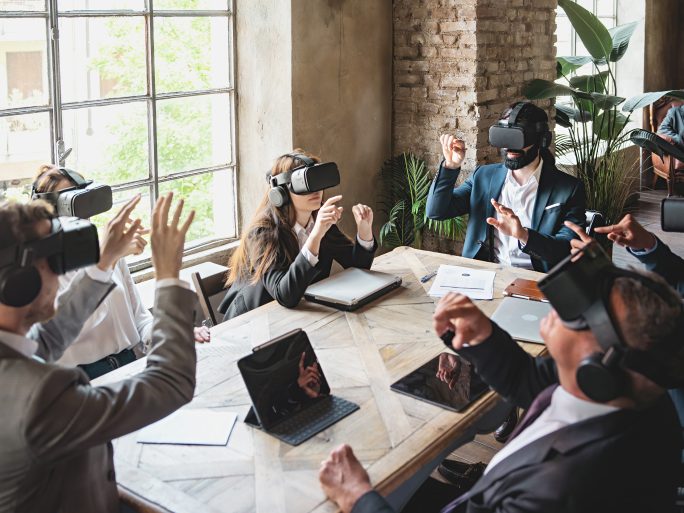How Metaverse Will Change Life and Work by 2027

Metaverse trends that will change daily life and business in the next five years.
Metaverse in the workplace
The Metaverse will transform the workplaces of millions of people with future collaboration in virtual spaces: Participation in conferences will no longer take place in meeting rooms or two-dimensionally on a video screen, but instead colleagues will take their seats at the table of a virtual 3-D room.
To take advantage of the metaverse, many companies are already combining traditional video conferencing with immersive tools – for example, using virtual reality goggles to enhance participant interaction. DXC Technology is using the Metaverse for its own teams in the workplace and observing positive effects of the virtual world on employee productivity, engagement and creativity. “Metaverse experiences help employees focus better and grasp more information,” says Nathalie Vancluysen, Head of Extended Reality at DXC Technology. “Virtual worlds help us move away from the routine of video conferencing and open the door for more collaboration and innovation.”
Large-scale virtual events
The Metaverse is a place where thousands of avatars from around the world come together to meet, interact and engage. Personalized 3D avatars, controlled by people from their respective locations, move freely in a nearly infinite space, teleporting from one place to another with the click of a button. This technology makes large-scale events such as conferences, exhibitions and summits possible in virtual worlds. This will lead to improved global collaboration and reduce the time, resources and carbon footprint of travel.
Bands, DJs, sports clubs and dating agencies move to the metaverse
Virtual venues are proliferating in the music and sports industries. Fans thus attend concerts and games from home. Dating apps like Nevermet and Flirtual also offer services in the metaverse. Over the next five years, consumers will be offered new interactive and immersive ways to interact in the virtual world as if they were in a physical world via their digital avatar.
Metaverse strengthens the brand
Virtual customer experiences will become commonplace as brand engagement companies look for exciting new ways to connect with their customers. Major retail brands such as Louis Vuitton, Adidas, Gucci, Coca-Cola and Nike, as well as automakers such as Nissan, Toyota and Ferrari, are already experimenting with virtual environments and augmented reality. DXC Technology expects that in the next five years, more and more companies will offer their customers the opportunity to explore their brands, solutions and services in 3D – from hotels to cities to airports
Metaverse strengthens the brand
Virtual customer experiences will become commonplace as brand engagement companies look for exciting new ways to connect with their customers. Major retail brands such as Louis Vuitton, Adidas, Gucci, Coca-Cola and Nike, as well as automakers such as Nissan, Toyota and Ferrari, are already experimenting with virtual environments and augmented reality. DXC Technology expects that in the next five years, more and more companies will offer their customers the opportunity to explore their brands, solutions and services in 3D – from hotels to cities to airports.
Finding employees and onboarding in transition
Recruiting talent is a key factor in a company’s success. The first step is to reach out to talent. By 2027, companies will increasingly rely on the metaverse to connect with candidates in a modern way. Conducting interviews in the Metaverse helps recruiters identify the employees they want and learn more than traditional resume data can provide.